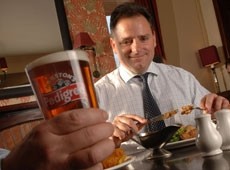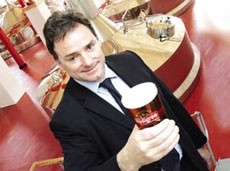Back trade and we’ll all thrive

Like never before, we need our policymakers and those who influence opinion to appreciate how our industry can contribute to the economy in the right conditions. Our message to the Government is that we can help you deliver growth. We can help create employment and strengthen local communities.
But the Government needs to help us, and it will do that only if the relationship between our industry and the Government is constructive, one of engagement, and based on a good understanding of the challenges we face.
This has been the focus of much of the British Beer & Pub Association’s (BBPA’s) activities over this year, and we have made good progress in some vital areas. Progress in communicating the many good things that pubs do, the role they play in our society, and in improving their image.
There has been a noticeable change in media commentary about where responsibilities lie in relation to the health, behavioural and social problems associated with alcohol abuse. The fact that pubs account for less than 15% of alcohol licences in the UK while supermarkets account for around 80% is better understood.
The message that most pubs are run by responsible licensees, and are places where the sale of alcohol is supervised, is also getting through. At a recent meeting with the Prime Minister, he reiterated to me his Government’s commitment to supporting beer and pubs, and demonstrated that he understands the vital contribution many pubs are making to their communities.
The minister for pubs, Bob Neill, has taken the time to meet industry representatives, and he is also very supportive of initiatives to promote pubs. But we can — and must — do much more: if David Cameron is serious, he should himself engage with us to hear about many of the positive ideas we have for pubs and brewing. After all, this sector supports nearly a million jobs — many of them for young people who desperately need opportunities.
With the right conditions, that could be many more. The PM has challenged us all to do more in creating apprenticeships and we
are responding to that call.
But let’s be clear. We will be in a stronger, more confident position as an industry to invest for the long-term and generate sustainable growth if we make genuine progress in cutting red tape and delivering a fairer tax burden on beer and pubs. We can help deliver growth.
We can create employment. We can strengthen communities. But we need less regulation and fairer taxes.
On regulation, we have responded to the coalition’s Red Tape Challenge. Over the past year the BBPA has worked hard on licensing laws through engagement with Government over the Police Reform and Social Responsibility Bill, the Localism Bill, and engaged in other areas important to Government such as on alcohol-unit labelling, the Responsibility Deal, and with Drinkaware.
We want the Government to go further in pushing for the cross-governmental alcohol strategy to make sure that policies intended to tackle alcohol harm are proportionate, pro-pub, and recognise the merits of lower-strength drinks.
We want ministers to do more in recognising the contribution that this industry makes to the rural economy.
Good progress has been made in improving communication and relationships with key officials within the Government.
Stinging rebuke
But we have to acknowledge that the tenanted and leased operators came in for a stinging rebuke from the Business, Innovation & Skills Committee (BISC) last month.
The committee placed the blame for pub failures squarely on landlords rather than the economy, regulation and taxation, and in considering the Pubs Independent Rent Review Scheme (PIRRS) and the new code of conduct found fault, rather than merit, in what the industry has done.
In this difficult trading environment, with many licensees struggling, we need cool heads because there is a real risk of intervention that will not help pubs and may make things worse. The rate of pub closures would not be falling and the total numbers would have been far greater were it not for the support — £265m last year alone — that we as an industry have invested with publicans in the tenanted and leased sector to help weather the storm.
The impact of that support is huge: yes, many pubs have failed — but this sector is not alone. Around 4,000 retail shops also shut in the first five months of this year. The national vacancy rate for shop units is 15%, and close to 30% in some towns. That’s around one in seven across the country. Small businesses are at a structural disadvantage in this downturn — ministers and the Chancellor must ask whether more red tape is the solution, or less red tape and fairer taxes.
And what must we do? Put simply, if tenanted and leased operators fail to live by the Framework Code of Practice that would be unacceptable. There is evidence that the Code is working. But we must not be reticent in pointing out the positive changes that have been made, and the benefits of the traditional tenanted model. We must be constructive in reviewing the BISC’s recommendations.
Damaging tax
On taxation, as he prepares for his autumn statement next month, our message to the Chancellor is clear. The current policy on beer duty is driving alcohol sales further away from pubs into the home, and damages British brewers. The duty escalator is an anti-pub tax, and a social and fiscal mistake.
Despite our campaigning and arguments, the duty escalator remains in place. How did that happen?
If you have read Alistair Darling’s memoirs, Back from the Brink: 1,000 days at Number 11, you will, I think, understand why it is that we have made so little progress on beer duty. The former Chancellor describes the atmosphere at Downing Street as one of “a permanent air of chaos and crisis”. The then PM, Gordon Brown, and the Chancellor had different views about the extent of the financial crisis, and Darling acknowledged that, in his own words, he was forced to present a 2009 Budget that “simply lacked credibility”.
He did not have a Budget 48 hours before he was due to present it, and was, again in his words, “forced to write parts of it literally until the last minute”.
Our economic arguments were good, and supported by most MPs. But this was the atmosphere into which we pitched our arguments for restraint on beer duty — looking back, it is clear the duty escalator was a desperate measure and one we could not have stopped at that time.
The fact remains this coalition Government has retained the escalator, which is set to further damage the industry in 2012. Having increased by more than 30% since 2009, duty is set to rise by another 7% next year.
Sucked dry
Pubs are being sucked dry by the Treasury: whatever the challenges the Treasury faces in balancing its books, we must continue to call for the escalator to be axed. British beer taxes are among the highest in Europe, and a threat to jobs and pubs. Last year the former Tory Cabinet minister Michael Portillo said Chancellors are addicted to alcohol duty: this Chancellor must be reminded of the benefits of moderation.
Taxation remains a key concern for brewers and pub operators. The widespread support for cutting the VAT rate in pubs shows that clearly. But the issue is wider than just VAT. It’s tax — on consumers and business. We need the Treasury to engage with us in reviewing alternatives to the present taxation system, and we need to recognise that the Treasury will not back proposals that are not fiscally neutral. It’s a huge challenge.
The BBPA is best placed of all the trade bodies to represent brewers and pub operators in responding to these many challenges to our business. It is the strongest in terms of its resources, including having significant financial reserves. It has the capacity to make a difference.
This year has not been an easy environment for the sector, economically or politically.
As we look ahead to the next 12 months — as the country prepares to celebrate the Queen’s Diamond Jubilee and hosts the Olympics — the industry and Government have a great opportunity to put beer, pubs and communities at the heart of our celebrations, to help drive economic recovery with the more supportive fiscal and regulatory framework this great British industry needs.
Ralph Findlay is chief executive of Marston’s and chairman of the BBPA. The article above is an edited version of his speech to BBPA’s annual dinner last week.














